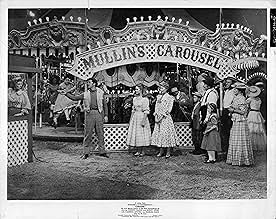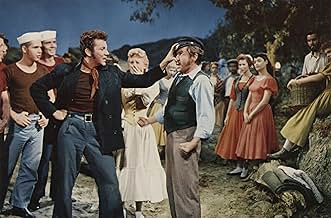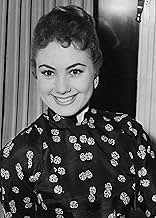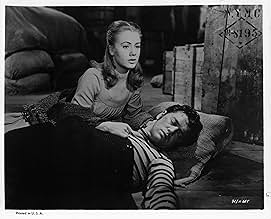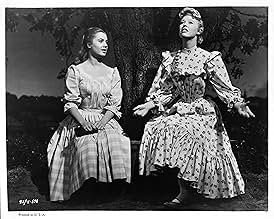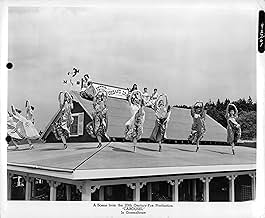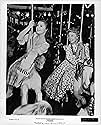Carousel
- 1956
- Tous publics
- 2h 8m
IMDb RATING
6.5/10
7.1K
YOUR RATING
Fifteen years after his death, a carousel barker is granted permission to return to Earth for one day to make amends to his widow and their daughter.Fifteen years after his death, a carousel barker is granted permission to return to Earth for one day to make amends to his widow and their daughter.Fifteen years after his death, a carousel barker is granted permission to return to Earth for one day to make amends to his widow and their daughter.
- Awards
- 1 win & 3 nominations total
William LeMassena
- Heavenly Friend
- (as William Le Massena)
Jacques d'Amboise
- Louise's 'Starlight Carnival' Dancing Partner
- (as Jacques D'Amboise)
Walter Bacon
- Graduation Spectator
- (uncredited)
Robert Banas
- Ruffian in Louise's Ballet
- (uncredited)
Tex Brodus
- Townsman
- (uncredited)
Buddy Bryan
- Dancer
- (uncredited)
Bob Calder
- Dancer
- (uncredited)
Harry Carter
- Third Policeman
- (uncredited)
Featured reviews
The film of this classic musical is a joy to watch and listen to.
The music is undoubtedly the finest Rodgers and Hammerstein
score.
Of the many fine moments in the film two astounding highlights
must be Billy's Soliloquy and the Shirley Jones' and Gordon
MacRae's lover's duet "If I loved you".
To this is added two great ballet sequences "June is Bustin' out all
Over" and Louise's ballet.
The film is Rogers and Hammerstein at their most dark and
introspective, which may account for the film's relatively lacklustre
reception at the time of its initial release but the at the same time
explains the ongoing appeal of this truly timeless classic film.
It is a fine memorial to both composer and lyricist and to the
artistry of Gordon MacRae whose performance of the soliloquy is
the benchmark against which all performances are judged.
The film was produced in Cinemascope 55 a large film fomat
which overcame many of the problems that were inherent in early
Cinemascope films (even though the film was actually released
only in standard 35mm form ..a bit like a 35mm print of a 70mm
film this still results in a far better image) and gives the film its
immaculate look.
The Fox DVD is crisp and the sound, though very clearly a 1950s
recording is clean and well balanced.
I just wish I could see this film in a cinema on the biggest of
screens... it would be an even more special experience!
The music is undoubtedly the finest Rodgers and Hammerstein
score.
Of the many fine moments in the film two astounding highlights
must be Billy's Soliloquy and the Shirley Jones' and Gordon
MacRae's lover's duet "If I loved you".
To this is added two great ballet sequences "June is Bustin' out all
Over" and Louise's ballet.
The film is Rogers and Hammerstein at their most dark and
introspective, which may account for the film's relatively lacklustre
reception at the time of its initial release but the at the same time
explains the ongoing appeal of this truly timeless classic film.
It is a fine memorial to both composer and lyricist and to the
artistry of Gordon MacRae whose performance of the soliloquy is
the benchmark against which all performances are judged.
The film was produced in Cinemascope 55 a large film fomat
which overcame many of the problems that were inherent in early
Cinemascope films (even though the film was actually released
only in standard 35mm form ..a bit like a 35mm print of a 70mm
film this still results in a far better image) and gives the film its
immaculate look.
The Fox DVD is crisp and the sound, though very clearly a 1950s
recording is clean and well balanced.
I just wish I could see this film in a cinema on the biggest of
screens... it would be an even more special experience!
Rodgers & Hammerstein's brilliant stage musical comes to the screen with most of the music intact--and what songs they are. Each one is a gem and fully integrated into the tragic storyline. Gordon MacRae stars as Billy Bigelow, the amusement park barker who tries to change his life when he marries Julie Jordan (Shirley Jones)-- with tragic results. MacRae's robust baritone is showcased in his big number, 'Soliloquy', performed at seaside with the ocean backdrop. Only occasionally is the use of stagebound sets a jarring note--but overall, the look and feel of the movie is one of genuinely moving musical drama.
Delightful performances from Barbara Ruick and Robert Rounseville as Mr. and Mrs. Snow. Their 'When The Children Are Asleep' is a charming highlight. Claramae Turner does an outstanding job on 'You'll Never Walk Alone'. Cameron Mitchell is a slyly villainous Jigger. Filming of the 'June Is Bustin' Out All Over' number in Boothsbay Harbor, Maine is a production highlight and choreographer's dream.
Gordon MacRae and Shirley Jones are in excellent voice for 'If I Loved You'. What more could you want? An exceptional movie musical that ranks with the best of Rodgers & Hammerstein's works.
Delightful performances from Barbara Ruick and Robert Rounseville as Mr. and Mrs. Snow. Their 'When The Children Are Asleep' is a charming highlight. Claramae Turner does an outstanding job on 'You'll Never Walk Alone'. Cameron Mitchell is a slyly villainous Jigger. Filming of the 'June Is Bustin' Out All Over' number in Boothsbay Harbor, Maine is a production highlight and choreographer's dream.
Gordon MacRae and Shirley Jones are in excellent voice for 'If I Loved You'. What more could you want? An exceptional movie musical that ranks with the best of Rodgers & Hammerstein's works.
I saw Carousel for the very first time in its first release when it played a double bill with Oklahoma. You can't do much better than that for an introduction to the American Musical Theater.
It would get a perfect 10 had it been done with the original two leads that were set for the show, Frank Sinatra and Judy Garland. Judy backed out before production started and Sinatra shortly after that, so Gordon MacRae and Shirley Jones got to do a second Rodgers&Hammerstein classic.
Carousel is based on the Ferenc Molnar play Liliom and the original setting is in Molnar's native Hungary. On Broadway it was done by Eva Le Gallienne and Joseph Schildkraut and later in revival by Ingrid Bergman and Burgess Meredith. One man who did it in summer stock was Tyrone Power who if a straight dramatic version of Liliom had ever been done, would have been perfect.
Whether he's Liliom in Hungary or Billy Bigelow in 19th century New England, the part is one for a hero/heel that Tyrone Power patented on the screen. Probably Gordon MacRae benefited in no small way in having Power's favorite director Henry King in charge of Carousel.
Richard Rodgers was also used to writing for a hero/heel having done Pal Joey with his former partner Lorenz Hart. Billy is that kind of guy, a carousel barker and boy toy to owner Audrey Christie when he spots Julie Jordan and her friend Carrie Pipperidge, a couple of mill workers. It's love at first sight and marriage shortly after, but Billy's not a guy to change his layabout ways and it ends in tragedy.
One reason that Sinatra was also so right for the part was that he had made a successful hit record of Billy's Soliliquy back in 1945 when Carousel debuted on Broadway. It was a groundbreaking piece of musical theater that Dick Rodgers and Oscar Hammerstein were responsible for in the Soliliquy. Billy's just been told by Julie he's about to become a father. In an almost 10 minute number he bares his soul to the audience and sings/thinks aloud the moves he's going to make. The song is almost operatic in quality, it takes a real singing actor to put it over like Sinatra, like MacRae is here, like John Raitt in the original cast on stage.
Though it's not Julie's song, Judy Garland had a successful record with You'll Never Walk Alone. I'm sure she would have sung it in the film had she seen it through. It's probably the big hit song from the score, still an inspiring number today.
Rounding out the cast is Cameron Mitchell as Billy's no good pal Jigger, Robert Rounseville and Barbara Ruick as Mr. Snow and Carrie, the second leads and from the Metropolitan Opera Claramae Turner as Julie's cousin Nettie who does sing You'll Never Walk Alone.
Two more who are perfectly cast are John Dehner as the officious mill owner that employs the girls and the heavenly star-keeper, Gene Lockhart in one of his last roles.
Even more than in Oklahoma, Agnes DeMille's ballet numbers are used to advance the plot. From the exuberant June Is Busting Out All Over to the dance that Billy and Julie's daughter does, all are done with taste and style.
Carousel is both tragic and yet uplifting and inspiring. It's a musical for all the ages to come.
It would get a perfect 10 had it been done with the original two leads that were set for the show, Frank Sinatra and Judy Garland. Judy backed out before production started and Sinatra shortly after that, so Gordon MacRae and Shirley Jones got to do a second Rodgers&Hammerstein classic.
Carousel is based on the Ferenc Molnar play Liliom and the original setting is in Molnar's native Hungary. On Broadway it was done by Eva Le Gallienne and Joseph Schildkraut and later in revival by Ingrid Bergman and Burgess Meredith. One man who did it in summer stock was Tyrone Power who if a straight dramatic version of Liliom had ever been done, would have been perfect.
Whether he's Liliom in Hungary or Billy Bigelow in 19th century New England, the part is one for a hero/heel that Tyrone Power patented on the screen. Probably Gordon MacRae benefited in no small way in having Power's favorite director Henry King in charge of Carousel.
Richard Rodgers was also used to writing for a hero/heel having done Pal Joey with his former partner Lorenz Hart. Billy is that kind of guy, a carousel barker and boy toy to owner Audrey Christie when he spots Julie Jordan and her friend Carrie Pipperidge, a couple of mill workers. It's love at first sight and marriage shortly after, but Billy's not a guy to change his layabout ways and it ends in tragedy.
One reason that Sinatra was also so right for the part was that he had made a successful hit record of Billy's Soliliquy back in 1945 when Carousel debuted on Broadway. It was a groundbreaking piece of musical theater that Dick Rodgers and Oscar Hammerstein were responsible for in the Soliliquy. Billy's just been told by Julie he's about to become a father. In an almost 10 minute number he bares his soul to the audience and sings/thinks aloud the moves he's going to make. The song is almost operatic in quality, it takes a real singing actor to put it over like Sinatra, like MacRae is here, like John Raitt in the original cast on stage.
Though it's not Julie's song, Judy Garland had a successful record with You'll Never Walk Alone. I'm sure she would have sung it in the film had she seen it through. It's probably the big hit song from the score, still an inspiring number today.
Rounding out the cast is Cameron Mitchell as Billy's no good pal Jigger, Robert Rounseville and Barbara Ruick as Mr. Snow and Carrie, the second leads and from the Metropolitan Opera Claramae Turner as Julie's cousin Nettie who does sing You'll Never Walk Alone.
Two more who are perfectly cast are John Dehner as the officious mill owner that employs the girls and the heavenly star-keeper, Gene Lockhart in one of his last roles.
Even more than in Oklahoma, Agnes DeMille's ballet numbers are used to advance the plot. From the exuberant June Is Busting Out All Over to the dance that Billy and Julie's daughter does, all are done with taste and style.
Carousel is both tragic and yet uplifting and inspiring. It's a musical for all the ages to come.
"Carousel" is the musical version of the old film "Liliom"--a story that was filmed many times since 1919. While I've not seen either silent version, I have seen the Frank Borzage version (1930) and the French language version by Fritz Lang (1934). I wasn't impressed by either of these films--mostly because the leading character was pretty despicable. He's a very selfish character who horribly mistreats his poor wife--and I wonder how they can make this a romance with such a horrible guy, as it severely undermines the story. So, "Carousel" begins with a major handicap, as hating the leading character makes it hard to fall in love with the film.
The film begins in New England. A very impressionable young lady (Shirley Jones) sees a handsome rogue (Gordon MacRae) at the carnival and the two inexplicably fall in love and decide to marry. I say inexplicably because he is a real womanizer and NOT the type to ever settle down. As for the marriage, it is a disaster--mostly because he is a ne'er-do'-well who is afraid to work or commit himself to his lovely wife. At times, such as when he learns he's about to become a father, he commits to changing but invariably he ends up returning to his old ways. Now I was a bit uncomfortable about this, as he apparently slapped his bride around--but they made LOTS of excuses for it, such as saying 'he's under a lot of pressure' or 'I only hit her once'! So much for a film that will empower the women in the audience! I just couldn't get past the fact he was a jerk who died while trying to rob someone!
This story is apparently all part of some flashback. You see, MacRae's character is dead and he's telling this to the head honcho up in Heaven because he wants permission to return for one and only one brief period. Now considering most of the flashback consists of him acting like a clod, you wonder how this is all going to convince the powers that be to grant his request!
As for the music, it's decent but the film clearly lacks the crowd-pleasing tunes of many of Rogers and Hammerstein's other works. "South Pacific", "Oklahoma" and the rest had more memorable songs--and didn't have to work so hard to compensate for an unlikable lead. Here, it's an uphill battle. Pretty, well made...but still a film that I had a hard time liking. Overall, it looks good but fails. Watchable but among the least in the Rogers and Hammerstein canon.
The film begins in New England. A very impressionable young lady (Shirley Jones) sees a handsome rogue (Gordon MacRae) at the carnival and the two inexplicably fall in love and decide to marry. I say inexplicably because he is a real womanizer and NOT the type to ever settle down. As for the marriage, it is a disaster--mostly because he is a ne'er-do'-well who is afraid to work or commit himself to his lovely wife. At times, such as when he learns he's about to become a father, he commits to changing but invariably he ends up returning to his old ways. Now I was a bit uncomfortable about this, as he apparently slapped his bride around--but they made LOTS of excuses for it, such as saying 'he's under a lot of pressure' or 'I only hit her once'! So much for a film that will empower the women in the audience! I just couldn't get past the fact he was a jerk who died while trying to rob someone!
This story is apparently all part of some flashback. You see, MacRae's character is dead and he's telling this to the head honcho up in Heaven because he wants permission to return for one and only one brief period. Now considering most of the flashback consists of him acting like a clod, you wonder how this is all going to convince the powers that be to grant his request!
As for the music, it's decent but the film clearly lacks the crowd-pleasing tunes of many of Rogers and Hammerstein's other works. "South Pacific", "Oklahoma" and the rest had more memorable songs--and didn't have to work so hard to compensate for an unlikable lead. Here, it's an uphill battle. Pretty, well made...but still a film that I had a hard time liking. Overall, it looks good but fails. Watchable but among the least in the Rogers and Hammerstein canon.
I have had the relatively rare privilege of performing "Carousel" on stage, uncut, and with a full orchestra. The original "Carousel" that Rodgers and Hammerstein wrote for the stage is practically an opera, employing extended musical scenes that cover great stretches of plot and character by alternating music and dialogue. When one sees the "Carousel" on stage (with good voices and the original orchestrations), one begins to understand why this is considered one of the greatest musicals ever written.
"Carousel" on film is not nearly as overwhelming. The story is still there, as are the songs, for the most part. But they are just songs in the movie, scenes distilled to the bare bones of the melody on which the original sequence was based. You don't get the feeling, after hearing them sung, that you have learned anything new about the characters (excepting, of course, Billy Bigelow's "Soliloquy" which is left entirely intact).
For example, the "If I Loved You" bench scene between Julie Jordan (Shirley Jones) and Billy Bigelow (Gordon MacRae) lasts almost fifteen minutes once the music starts. What the characters don't tell us about themselves, the music does, throwing melodies left and right until it finally culminates in the release of the famous love song. The scene has built up to this moment until it becomes the only way that Julie can tell Billy that she loves him. In the movie, however, it is all talk until Julie starts singing "If I Loved You". The song seems to come much more out of left field and does not seem nearly as satisfying. Billy repeats the song and the scene ends. As a result, their falling in love with each other doesn't make much sense because the scene really hasn't built up to it.
Several songs which delineate the supporting characters are either severely truncated (such as the musical/character sequence between Carrie Pipperidge (Barbara Ruick) and Enoch Snow (Robert Rounseville)) or cut entirely (such as "Blow High, Blow Low" which could have been a choreographer's dream). As for the choreography itself, surely "June is Bustin' Out All Over" could have been staged with a little more imagination instead of confining itself to the roof and deck of Nettie Fowler's spa. And it does feel confined. This is a song about abandoning the human spirit to the glories of the summer season, a feeling that covers much more territory than just a dining patio.
I do like the casting in the film, although I believe that they were badly underdirected. Gordon MacRae and Shirley Jones seem a little lost here. Their talent is not in question as evidenced by their stellar performances in the movie version of "Oklahoma!". Clearly this movie, which had the potential to be a cinema classic, was helmed by someone who didn't understand the genius of Rodgers and Hammerstein. In other words, don't try to fix what ain't broke.
"Carousel" on film is not nearly as overwhelming. The story is still there, as are the songs, for the most part. But they are just songs in the movie, scenes distilled to the bare bones of the melody on which the original sequence was based. You don't get the feeling, after hearing them sung, that you have learned anything new about the characters (excepting, of course, Billy Bigelow's "Soliloquy" which is left entirely intact).
For example, the "If I Loved You" bench scene between Julie Jordan (Shirley Jones) and Billy Bigelow (Gordon MacRae) lasts almost fifteen minutes once the music starts. What the characters don't tell us about themselves, the music does, throwing melodies left and right until it finally culminates in the release of the famous love song. The scene has built up to this moment until it becomes the only way that Julie can tell Billy that she loves him. In the movie, however, it is all talk until Julie starts singing "If I Loved You". The song seems to come much more out of left field and does not seem nearly as satisfying. Billy repeats the song and the scene ends. As a result, their falling in love with each other doesn't make much sense because the scene really hasn't built up to it.
Several songs which delineate the supporting characters are either severely truncated (such as the musical/character sequence between Carrie Pipperidge (Barbara Ruick) and Enoch Snow (Robert Rounseville)) or cut entirely (such as "Blow High, Blow Low" which could have been a choreographer's dream). As for the choreography itself, surely "June is Bustin' Out All Over" could have been staged with a little more imagination instead of confining itself to the roof and deck of Nettie Fowler's spa. And it does feel confined. This is a song about abandoning the human spirit to the glories of the summer season, a feeling that covers much more territory than just a dining patio.
I do like the casting in the film, although I believe that they were badly underdirected. Gordon MacRae and Shirley Jones seem a little lost here. Their talent is not in question as evidenced by their stellar performances in the movie version of "Oklahoma!". Clearly this movie, which had the potential to be a cinema classic, was helmed by someone who didn't understand the genius of Rodgers and Hammerstein. In other words, don't try to fix what ain't broke.
Did you know
- TriviaThe film was not successful at the box office despite the positive reviews, but the soundtrack album became a national best seller.
- Goofs(at around 59 mins) Billy Bigelow (Gordon MacRae) sings the "My Boy Bill" soliloquy on the beach. One minute and 17 seconds into the song, four jets fly over in formation in the upper left of the frame. This scene was filmed on the beach near Paradise Cove, Malibu, California, in 1955, when there were several operating Navy and Marine military bases in southern California.
- Crazy creditsA star hurtles downward and explodes in mid-air; out of this appears the credit "Twentieth Century-Fox presents Rodgers and Hammerstein's Carousel". The other credits all appear in a straightforward fashion.
- Alternate versionsIn the film's first two telecasts on ABC-TV in 1966, Mrs. Mullin's line "I don't run my business for a lot of sluts." followed by Carrie's retort "Who you calling a slut? Slut yourself!" and Julie says "Yeah, slut yourself!" was edited out. The line was kept on all local station telecasts of the film, and on all video releases.
- ConnectionsFeatured in King of the Movies (1978)
- SoundtracksThe Carousel Waltz
(1945) (uncredited)
Music by Richard Rodgers
Performed by the 20th Century-Fox Studio Orchestra Conducted by Alfred Newman
Details
- Release date
- Country of origin
- Language
- Also known as
- Rodgers and Hammerstein's Carousel
- Filming locations
- Boothbay Harbor, Maine, USA(scenes outside Nettie's Spa and in marina, including musical numbers "June Is Bustin' Out All Over" and "When The Children Are Asleep")
- Production company
- See more company credits at IMDbPro
Box office
- Gross worldwide
- $1,104
- Runtime
- 2h 8m(128 min)
- Color
- Aspect ratio
- 2.55 : 1
Contribute to this page
Suggest an edit or add missing content




